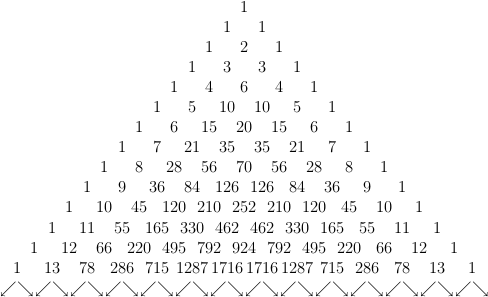Pascal's Triangle

Each entry in Pascal's triangle is formed by adding together its two "parents" contained in the previous row. The triangle continues indefinitely.
Counting from $0$, the $i^{th}$ entry in the $n^{th}$ row is given by the $i^{th}$ term in the binomial expansion of $(1+1)^n$. That is $\binom{n}{i} = \frac{n!}{i!\times (n-i)!}$. For example $\binom{6}{3}$ $=$ $\frac{6!}{3!\times 3!}$ $=$ $\frac{6\times 5\times 4\times 3\times 2\times 1}{3\times 2\times 1\times 3\times 2\times 1}$ $=$ $\frac{6\times 5\times 4}{3\times 2\times 1}$ $=$ $\frac{120}{6}$ $=$ $20$.
Apart from the ends of $1$, prime row entries are divisible by the prime. This arises from the fact that no number in the binomial fraction's denominator divides the prime contained in its numerator. For example $462$ in the $11^{th}$ row is divisible by $11$. That is $462 = 11\times42$.